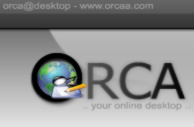Orca - a WebOS with a difference


One immediate question I had for Leon was: does he see any crossover between the webOS and the Web Office? Obviously they are linked in that they both use the Web as a platform. But the companies/startups doing webOS products don't seem to be the same ones doing Web Office. Leon replied:
"The typical WebOffice creator is focused on the functions he/she can provide the user, while the WebOS creator sees the WebOffice as 'just another application'. In Orca we try to do everything just a little different - the WebOffice module is a kernel module and replaceable with other versions (like HyperOffice, WebEX etc.)."
Orca is being developed by Danish company 4th-corner.com. The product is divided into 3 parts:
1) The actual WebOS part is named Orca@desktop and it runs on 3 different "cores" - each optimized to a specific browser/client.
2) The Linux Distribution (distro) is called Orczilla - according to Leon it "uses FF and has XUL application activated on the serverside".
3) Orca local is a server which is connected to your local network - currently in testing.
So Orca is more than just a desktop on the Web, it also has a Linux distribution and comes with a server. Leon told me that his team is currently busy integrating the core technology and apps. Orca has 32 applications "and counting" - including a Bittorrent client, a messenger (that works with all major networks), an office package, "webmce" (a MCE look-a-like interface) WebTV. More product details here.
Orca also plans to enable users to add Google modules and Microsoft gadgets onto their Orca desktop - i.e. the widgets found on google.com/ig and live.com/Windows Vista. They will invite Yahoo and Apple to develop to it as well.
So what makes Orca different from the other WebOS solutions? Leon gave me four reasons:
"1) Orca is a umbrella project, uniting all WebOS into ONE solution.
2) We are open to all development languages - e.g. XUL in OrcZilla.
3) Better use of ajax functions - ajax is a powerful enemy and ally...
4) We don't do it for the money."
He went on to give me an interesting possible use case for Orca - one in which Orca would complement the famous MIT $100 PC:
"Orca is preparing to launch at Danish schools [so] how about we put Orca on those MIT computers? With some help from Google's wifi project, we could bring western knowledge to very large amount of people - while keeping software updates on the cheap side. Not to mention the fact that students, developers, everyone -- can create their own applications with simple html or just a few clicks on a mouse."
This may be more dream than reality at the moment, but it does highlight a couple of the potential advantages of a WebOS - that it's cheap to deploy and relatively easy for people to use.
I'm currently testing out Orca, so will report back my findings in a later post. For now, go check it out yourself and please tell me what you think.